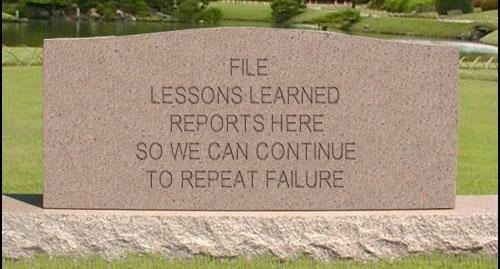
You Can Lead a Firm to Knowledge but You Can't Make It Think
This was the title of an unpublished research paper I wrote several years ago, with the subtitle "Developing a Framework for Organizational Lessons Learned." It was a direction I was headed in for my doctoral dissertation until I got pulled into the Working Out Loud movement. I had forgotten about this paper until I was doing some file clean-up recently. On re-reading it, I thought there were some interesting points that might be worth sharing.
I have been interested in the ideas of organizational learning and "lessons learned" for a long time. One thing that always bothered me was that many executives will toss around phrases like lessons learned or captured learning and stress the need to learn from mistakes, without any real definition of what learning means in an organizational context. We know from schooling what learning lessons means for us as individuals, but what does a lesson look like for a corporation? How would we recognize one and how would we know if the company had learned it?
I looked at organizational learning models from 17 different practitioners and academic researchers, and consolidated them into nine stages of what I call the Lessons Learned Life Cycle. They are:
- Initiation: Some event that triggers the need to capture a lesson.
- Recognition: The awareness by the organization that the event in question contains a lesson.
- Capture: Gathering the essential facts, stories, and other elements that will create the lesson.
- Validation: How do we know that the lesson we want to preserve is valid and correct?
- Scoping: Determining how broad or narrow the applicability of this lesson is to the organization.
- Storage: How will this lesson be preserved so that it can be accessed in the future?
- Dissemination: Getting the lesson into the hands (and heads!) of the people in the organization who need to know it.
- Institutionalization: This is probably the most crucial stage. How do we ensure that the lesson is embedded so deeply in the organization that we can say that it has been learned? What does it even mean for a company to learn something?
- Maintenance: Some lessons are context or time dependent. The usefulness of a lesson might fade over time, and today's best practice could even become tomorrow's disaster as situations change. So how do we ensure that lessons remain fresh and relevant? How do we guarantee that we have not only organizational memory but also organizational forgetting where appropriate?
These are my own labels for the nine stages. Below, I've included a table from my paper so that you can see how I arrived at them and what others have called them. In subsequent posts here, I'll dive into each stage in detail.
Continue to Part 2: What is a Lesson?

Guiding Strategic Business & Digital Transformation
1yHi Dennis! 👋🏻 I just wanted to let you know I'm leading a major "lessons learned" initiative for a customer and this is the first place I came, nearly 5 years on. Thanks always for sharing what you learn!
Digital Workplace, Knowledge Sharing, Internal Communications, Social Learning, and Online Community Strategist
5yDennis, Thank you for sharing these lessons learned posts. Am digging into them to inform some work I’m doing. Between your posts and Nick Milton’s Lessons Learned book, I feel like I’ll have a good base to start from.
Knowledge Management Consultant // Co-founder of Daneshkar Management Consulting Group
5yFarnoosh aghalar
Digital Transformation Technologist, Evangelist, Strategist and Enthusiast
6yHa! I want that picture because I was having EXACTLY this conversation this morning.